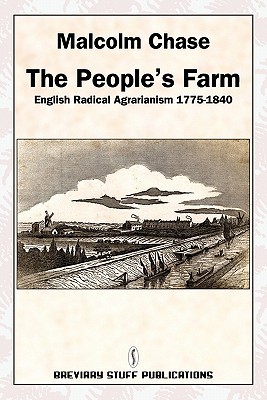
- We will send in 10–14 business days.
- Author: Malcolm Chase
- Publisher: Breviary Stuff Publications
- ISBN-10: 0956482759
- ISBN-13: 9780956482754
- Format: 15.2 x 22.9 x 1.2 cm, minkšti viršeliai
- Language: English
- SAVE -10% with code: EXTRA
The People's Farm, English Radical Agrarianism 1775-1840 (e-book) (used book) | bookbook.eu
Reviews
Description
This book traces the development of agrarian ideas from the 1770s through to Chartism, and seeks to explain why, in an era of industrialization and urban growth, land remained one of the major issues in popular politics. Malcolm Chase considers the relationship between 'land consciousness' and early socialism; attempts to create alternative communities; and contemporary perceptions of nature and the environment. He concludes that, far from being an anachronistic, utopian, and reactionary movement, agrarianism was an integral part of the working class experience and of radical politics. The People's Farm also provides the most extensive study to date of Thomas Spence, and his followers the Spenceans. New light is thrown on the Spa Fields and Cato Street conspiracies, in which they were involved; but their true significance lies in their contribution to English radicalism - a key factor in shaping the politics of agrarian reform in the 1820s and 1840s.
EXTRA 10 % discount with code: EXTRA
The promotion ends in 23d.17:29:28
The discount code is valid when purchasing from 10 €. Discounts do not stack.
- Author: Malcolm Chase
- Publisher: Breviary Stuff Publications
- ISBN-10: 0956482759
- ISBN-13: 9780956482754
- Format: 15.2 x 22.9 x 1.2 cm, minkšti viršeliai
- Language: English English
This book traces the development of agrarian ideas from the 1770s through to Chartism, and seeks to explain why, in an era of industrialization and urban growth, land remained one of the major issues in popular politics. Malcolm Chase considers the relationship between 'land consciousness' and early socialism; attempts to create alternative communities; and contemporary perceptions of nature and the environment. He concludes that, far from being an anachronistic, utopian, and reactionary movement, agrarianism was an integral part of the working class experience and of radical politics. The People's Farm also provides the most extensive study to date of Thomas Spence, and his followers the Spenceans. New light is thrown on the Spa Fields and Cato Street conspiracies, in which they were involved; but their true significance lies in their contribution to English radicalism - a key factor in shaping the politics of agrarian reform in the 1820s and 1840s.


Reviews